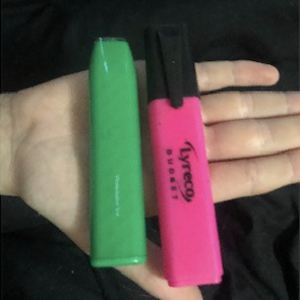Stefan Bjes is a former school resource officer, and he wants parents to know: Just about everything in your kids’ backpacks could actually be a vape.
An exaggeration?
“One in particular is designed to look like a highlighter, but it’s actually a vape device,” Bjes told NHJournal. “Another one looks like a USB thumb drive.” He has also seen these single-use vapes disguised as ballpoint pens and smartphones.
“There’s even one I saw where the strings through the hoodie of a sweatshirt were actually a vape device.”
“Disposable vapes in kid-enticing flavors are illegal in the United States, yet are still widely available and criminally trafficked in stores nationwide,” Bjes said. And disguising disposable vapes proves the target market is kids, not adults. “Why would an adult need a vape that’s designed to look like a highlighter?”
Vaping is central to a national debate between promoting public health and protecting kids. For millions of adult smokers, vapes are a substitute for traditional — and far more dangerous — combustible cigarettes. And for many public health advocates, anything that keeps people from smoking is a win.
Dr. Michael Siegel, professor of Public Health and Community Medicine at Tufts University, argued e-cigarettes could be the beginning of the end of smoking in America.
“The whole point of vapes is that they are not tobacco,” according to Siegel. If they were tobacco, they would have zero market share because the only real reason that [adult] vapers vape is that they are trying to avoid the tobacco.”
On the other side of the argument are parents and government agencies concerned about teen vaping, which has drastically increased over the past decade. According to a Centers for Disease Control and Prevention report, 14.1 percent of high school students had recently used an e-cigarette or other vape product in the first half of last year.
The top concern is the widespread availability of cheap, disposable vapes manufactured in Asia and shipped to the U.S. “Illegal, flavored, disposable vapes are driving the youth vaping epidemic,” Bjes said.
Bjes spent 21 years in law enforcement, many of them as a school resource officer in the suburbs of Chicago.
“When I first went into the schools, vaping was just starting to emerge as a problem,” Bjes said. “We’re talking 2013 and 2014. Back then, in my old school district, I would have one or two incidents [involving vapes] in a year.
“Now they’re getting 300 in a school year.”
The use of vapes at school is so widespread, Bjes told NHJournal, “at least one school district went as far as actually removing the bathroom doors and the stalls in their bathrooms as a way to kind of combat this.”
Ironically, both advocates of e-cigarettes as a tool in the fight against smoking and critics of the U.S. vaping industry have identified the same problem: A lack of action by the Food and Drug Administration, particularly on illegal disposable vapes in kid-friendly flavors.
“The FDA also needs to do its part by stepping up enforcement and coordination with state and local authorities to ensure they have the support and clarity they need to get these dangerous illegal disposable vapes off the shelves immediately,” Bjes said.
Clive Bates, former director of Action on Smoking and Health U.K. and now director of Counterfactual, agreed. During a recent public health roundtable hosted by InsideSources, he pointed to the agency’s failure to act.
“The FDA had 6 million applications for new products to come onto the market, these safer products,” Bates noted. “So far, it’s rejected nearly all of them, well over 5 million, and it’s accepted seven. Just seven distinct product systems have been accepted.”
With so few approved and regulated products on the market, unauthorized manufacturers in Asia have flooded the U.S. with vapes — many targeting teens.
“Manufactured by Chinese firm iMiracle Shenzhen, Elf Bar is part of a wave of copycat e-cigarettes that have followed a path paved by Puff Bar, a popular brand of disposable e-cigarettes that briefly racked up hundreds of millions in sales after regulators cracked down on older vaping products like Juul,” the Associated Press reported.
And even if the FDA stepped up enforcement, Bjes noted, the disposable vapes are still easily accessible online with just a mouse click. As a result, he said, parents need to step up.
“Most parents aren’t aware that these items are out there and readily available for the kids to get. So I think it comes down to education. I think it comes down to parents being involved.”





